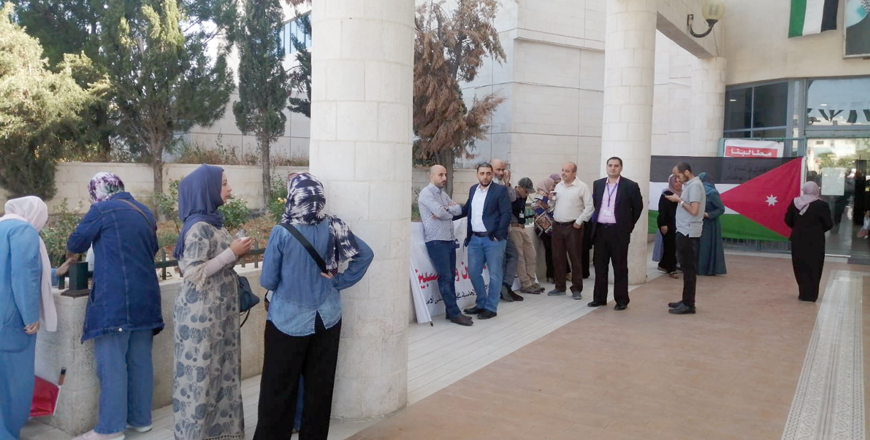AMMAN — Workers at Prince Hamza Hospital organised a two-hour protest on Sunday, demanding that the Health Ministry uphold its decision to increase salary allowances.
The Jordan Times spoke with Mohammad Amer, a radiology technologist and head of the Committee for Healthcare Support, Management and Accounting Professions at the hospital, which organised the protest.
He explained that Health Minister Firas Al Hawari issued a decision in 2021 to grant a technical allowance equal to 135 per cent of the basic salaries of healthcare support workers, associate nurses, legal professionals, and workers in information technology, management and accounting at the Ministry of Health in 2022.
Other demands were related to overtime work, incentive plans, transportation allowances and a 30 per cent risk allowance for workers in radiology, Amer said.
According to Amer, healthcare support technicians, nurses and pharmacists all starts with a basic salary of JD150 plus a cost-of-living allowance equal to JD135 and a JD20 allowance if the employee has a family.
However, the technical allowance for healthcare support technicians equals 70 per cent of his or her basic salary, while that of nurses and pharmacists equals 135 and 145 per cent, respectively.
Doctors, on the other hand, begin with a basic salary JD165 in addition to a cost-of-living allowance equal to JD135, a JD20 allowance for those who have families and a technical allowance equal to 160 per cent of their basic salary.
For management workers and accountants, the current technical allowance ranges between 25 and 45 per cent of their basic salaries.
“This pay discrimination between healthcare workers is unfair, and it has to stop… our work is no less essential than that of nurses and doctors,” Amer said.
The Minister of Health told Al Mamlaka TV in April that the restructuring process implemented by the ministry in May 2022 has allowed it to save around JD2.6 million in salaries, Amer noted. “This means that the ministry can afford the increase,” he said.
Barkat Daghlas, who has been a lab technician at the hospital for the past 18 years, also participated in the protest.
He pointed out that the salary disparities between healthcare workers are “outrageous”.
“We’re exhausted, underappreciated and underpaid,” he told The Jordan Times.
“We’ve been demanding this increase for over two years, but we don’t feel heard,” Daghlas added.
The committee also organised a protest on May 14, in which 270 employees participated, according to Amer.
The May 14 protests included management workers, medical record clerks, radiology technicians, lab technicians, speech and hearing technicians, optical technicians, anaesthetic technicians and physical therapy technicians, Amer added.
Ibrahim Alboureni, an accountant who took part in the protest, alleged that following the first protest, 110 employees were questioned by the Internal Control Unit at the Ministry of Health and received a verbal warning for protesting.
“That’s why the number of participants dropped to 180 during the second protest. Even though it was for two hours only, all participants signed a leave request for that duration, because our only goal is to voice our demands,” he told The Jordan Times.
Despite repeated attempts by The Jordan Times to contact the Health Ministry and Prince Hamza Hospital, officials were unavailable to comment.
Alboureni said that another protest will be organised for next Sunday if workers’ demands remain unmet by then.
